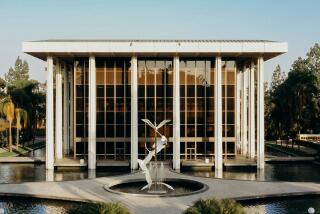STRAUSS RECITAL : NORMAN’S RETURN TO AMBASSADOR
- Share via
Regal, serene, gracious of manner and wearing a flowing gown decorated in autumnal colors, Jessye Norman sweeps onto the stage at Ambassador Auditorium, as she has several times in the past decade, and waits purposefully before beginning her recital--on this occasion, an agenda of 20 songs by Richard Strauss.
When she sings, it is with deliberate care and well-planned pacing of her vocal resources. The soprano from Georgia, who now makes her home in England, does not hurry about anything. Indeed, her stage waits could become a mannerism.
How much things have changed in the 11 years since Norman sang her first Los Angeles recital, in Thorne Hall at Occidental College, before a tiny audience of fans and cognoscenti. She had already appeared with our Philharmonic, of course, and was considered a comer in many quarters, but the recordings, the adulation and the Met were still in her future.
Wednesday, she arrived as a bona fide diva and major international singer in her prime, despite technical inconsistencies and the distinct possibility that
her vocal condition on this occasion was less than prime. Her program of Strauss Lieder, including a number of items she has sung here before--even a few from that Occidental recital in 1975--indicated and promised more than it actually delivered.
Textual specificity, that ultimate province of the dedicated and superior recital singer, still remains, for the most part, elusive in Norman’s performances. With her voluptuous voice, which she colors nicely some of the time, and parts of which she utilizes to differentiate moods and character, she shapes the outside of each song without always producing that kernel of meaning or insight to touch the listener.
When it comes, her achievement of a complete reading--as she delivered in a poignant, deeply affecting performance of “Befreit”--only points up how far short of the mark are many of her other readings.
Nevertheless, a happy throng of diva-watchers seemed to be thrilled at every item on this program, and at the solid and single-minded collaboration Norman displayed with her latest pianist, English musician Charles Spencer.
At the end, there were three encores: Strauss’ “Wir beide wollen springen,” Copland’s “Why Do They Shut Me Out of Heaven” and Margaret Bonds’ arrangement of “He’s Got the Whole World in His Hands.”
More to Read
The biggest entertainment stories
Get our big stories about Hollywood, film, television, music, arts, culture and more right in your inbox as soon as they publish.
You may occasionally receive promotional content from the Los Angeles Times.










